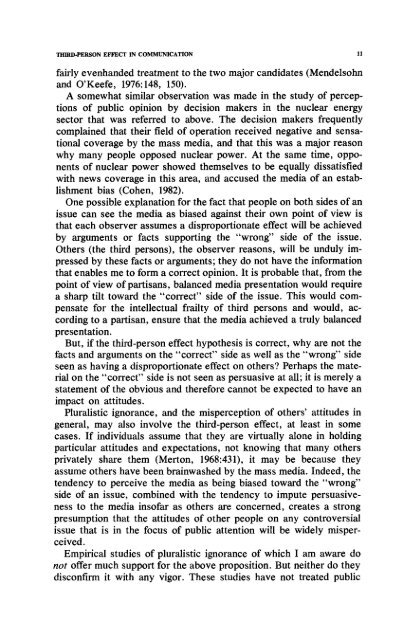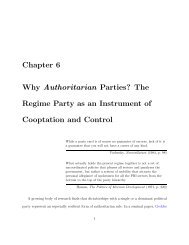The Third-Person Effect in Communication W. Phillips Davison The ...
The Third-Person Effect in Communication W. Phillips Davison The ...
The Third-Person Effect in Communication W. Phillips Davison The ...
Create successful ePaper yourself
Turn your PDF publications into a flip-book with our unique Google optimized e-Paper software.
THIRD-PERSON EFFECT IN COMMUNICATION 11<br />
fairly evenhanded treatment to the two major candidates (Mendelsohn<br />
and O'Keefe, 1976: 148, 150).<br />
A somewhat similar observation was made <strong>in</strong> the study of percep-<br />
tions of public op<strong>in</strong>ion by decision makers <strong>in</strong> the nuclear energy<br />
sector that was referred to above. <strong>The</strong> decision makers frequently<br />
compla<strong>in</strong>ed that their field of operation received negative and sensa-<br />
tional coverage by the mass media, and that this was a major reason<br />
why many people opposed nuclear power. At the same time, oppo-<br />
nents of nuclear power showed themselves to be equally dissatisfied<br />
with news coverage <strong>in</strong> this area, z<strong>in</strong>d accused the media of an estab-<br />
lishment bias (Cohen, 1982).<br />
One possible explanation for the fact that people on both sides of an<br />
issue can see the media as biased aga<strong>in</strong>st their own po<strong>in</strong>t of view is<br />
that each observer assumes a disproportionate effect will be achieved<br />
by arguments or facts support<strong>in</strong>g the "wrong" side of the issue.<br />
Others (the third persons), the observer reasons, will be unduly im-<br />
pressed by these facts or arguments; they do not have the <strong>in</strong>formation<br />
that enables me to form a correct op<strong>in</strong>ion. It is probable that, from the<br />
po<strong>in</strong>t of view of partisans, balanced media presentation would require<br />
a sharp tilt toward the "correct" side of the issue. This would com-<br />
pensate for the <strong>in</strong>tellectual frailty of third persons and would, ac-<br />
cord<strong>in</strong>g to a partisan, ensure that the media achieved a truly balanced<br />
presentation.<br />
But, if the third-person effect hypothesis is correct, why are not the<br />
facts and arguments on the "correct" side as well as the "wrong" side<br />
seen as hav<strong>in</strong>g a disproportionate effect on others? Perhaps the mate-<br />
rial on the "correct" side is not seen as persuasive at all; it is merely a<br />
statement of the obvious and therefore cannot be expected to have an<br />
impact on attitudes.<br />
Pluralistic ignorance, and the misperception of others' attitudes <strong>in</strong><br />
general, may also <strong>in</strong>volve the third-person effect, at least <strong>in</strong> some<br />
cases. If <strong>in</strong>dividuals assume that they are virtually alone <strong>in</strong> hold<strong>in</strong>g<br />
particular attitudes and expectations, not know<strong>in</strong>g that many others<br />
privately share them (Merton, 1968:431), it may be because they<br />
assume others have been bra<strong>in</strong>washed by the mass media. Indeed, the<br />
tendency to perceive the media as be<strong>in</strong>g biased toward the "wrong"<br />
side of an issue, comb<strong>in</strong>ed with the tendency to impute persuasive-<br />
ness to the media <strong>in</strong>sofar as others are concerned, creates a strong<br />
presumption that the attitudes of other people on any controversial<br />
issue that is <strong>in</strong> the focus of public attention will be widely misper-<br />
ceived.<br />
Empirical studies of pluralistic ignorance of which I am aware do<br />
not offer much support for the above proposition. But neither do they<br />
disconfirm it with any vigor. <strong>The</strong>se studies have not treated public


